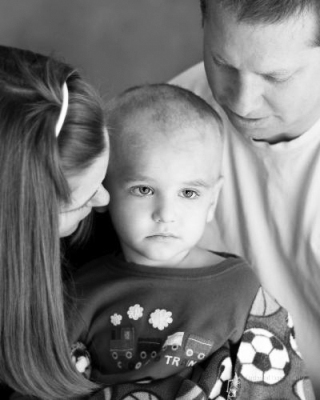Against all odds, Canton’s Mullen family presents ‘A Night of Hope’
By Jay TurnerEditor’s note: On December 19, 2010, Christopher Mullen passed away after a lengthy and courageous battle with neuroblastoma. He was 3. Christopher’s parents, Lisa and Chris, relayed the news on their online journal at www.caringbridge.org/visit/christophermullen/journal: “Christopher, our angel, is at peace.” The family held a celebration of Christopher’s life on January 23, on what would have been his fourth birthday.
On Saturday night, May 15, a young couple from Canton will throw a big party at the Boston Teachers’ Union Hall in Dorchester, complete with live music, hors d’oeuvres, a cash bar, raffle items, and even a silent and live auction. Tickets go for $25, and the couple, Lisa and Chris Mullen, would like nothing more than to see the place filled to capacity.
They are promising a fun evening out as well as a “Night of Hope,” with every dollar raised going directly to a Vermont oncologist who just might hold the key to saving their son’s life.
The doctor, Giselle Sholler, is a pediatric cancer specialist working out of Fletcher Allen Hospital at the University of Vermont in Burlington. Sholler is one of only a handful of doctors in the country currently developing novel treatments for relapsed neuroblastoma patients, and the Mullens’ youngest child, 3-year-old Christopher, is one of them.
At this point, the odds of survival are admittedly low — or as Lisa more accurately put it in her online journal, the “statistics suck” — but Dr. Sholler and her team are getting promising results from early clinical trials, and they plan to continue adding new trials as long as the funding holds up.
And for families like the Mullens, who have all but exhausted conventional treatment options, that kind of hope is as good as gold.
Hope, after all, is what the Mullens have lived on for the better part of two years, ever since they brought Christopher to Children’s Hospital with an apparent ear infection and received a far more serious diagnosis: Stage IV neuroblastoma, primary tumor in the left adrenal gland, two nodules in his lungs, and a spot on his right femur.
Lisa said she remembers staring at her son, just 18 months old at the time, in total shock that “this was inside of him.”
She described the scene in her journal: “[The doctors] left the room and Chris was sitting in a chair holding Christopher and I was kneeling down next to them, shaking, crying, in total disbelief. As Chris puts it, ‘We were hit by a wall.’”
“Even today I can’t believe that this is inside,” she said last week. “It’s still a complete shock, and he’s been sick for more than half of his life.”
Known as the “great masquerader” because its symptoms mimic those of many other diseases, neuroblastoma is truly a mysterious form of cancer whose causes are not well understood. While statistically rare, it is the most common cancer in infants and the third most common in childhood. It is also one of the few cancers known to spontaneously “cure itself” if detected early enough, yet has proven to be borderline incurable in its most advanced stages.
Originating in the cells of the sympathetic nervous system, the disease typically manifests as a solid mass in the abdomen; in Christopher’s case, CT scans revealed a tumor so large that it took up his entire abdomen — roughly equal to the size of ten golf balls.
Over the next several months, Christopher underwent a comprehensive and aggressive treatment protocol, beginning with five rounds of chemotherapy, followed by surgery to remove any remaining cancer and then another round of chemo.
At first, everything went as planned, and by the end of the first round of chemo, Christopher was back to his normal self, “laughing and smiling” and playing with his older sister, Stella.
By Thanksgiving of 2008, Lisa was reporting “excellent news” in her journal regarding his primary tumor, which had shrunk by more than 75 percent in a matter of three months. A week later, surgeons removed what was left of it, and in early December he began his sixth round of chemotherapy.
“This is one tough little guy,” Lisa wrote on December 8. “He may cry over his pillow not being exactly right, but is tough as nails! We should be out of the hospital on Thursday!”
However, January brought a new set of challenges, including the first of two very painful stem cell transplants that would keep the Mullens in the hospital for several weeks at a time and away from family and friends — due to Christopher’s weakened immune system — for the better part of five months.
On multiple occasions their hospital stay was extended because of complications — everything from respiratory problems and high blood pressure to severe kidney problems.
Complications then continued following a 12-day cycle of radiation in May and then well into June, when they learned that Christopher would be ineligible for an experimental antibody therapy program at Children’s Hospital due to kidney and other issues.
Even worse, Lisa said Christopher went into a “fog of depression” that lasted for weeks and was almost unbearable to watch.
“To see him in this mental state at the age of 2 years old, it was just the worst thing ever,” she said. “It was a horrible, horrible summer.”
One day, however, for no discernible reason, the fog was lifted, and around that same time the doctors gave the Mullens their best news in over a year: “clean” scans and a status of N.E.D., or no evidence of disease.
(Click on Page 2 to continue reading)
Page 1 Page 2
Short URL: https://www.thecantoncitizen.com/?p=1758











